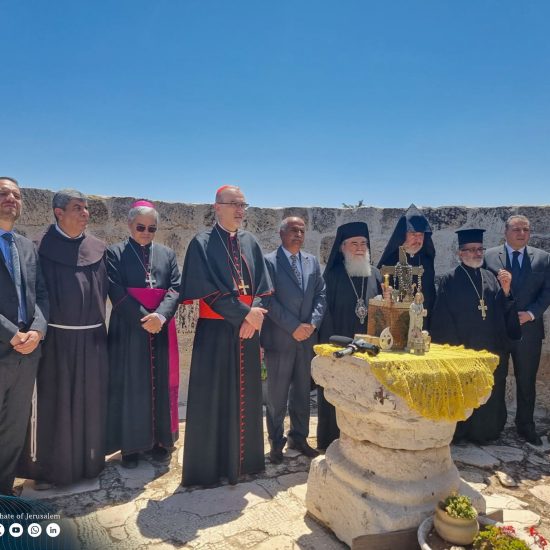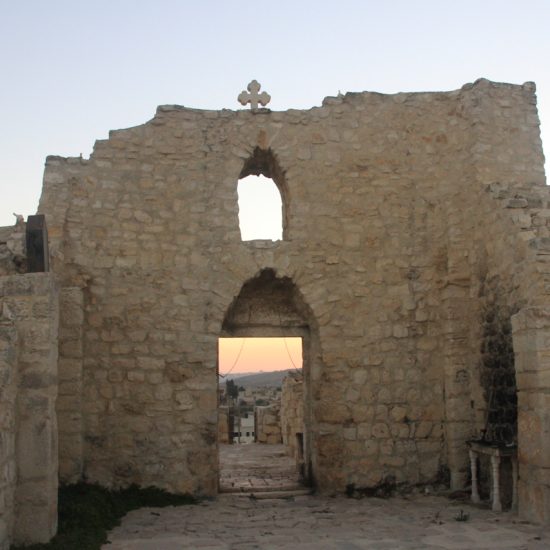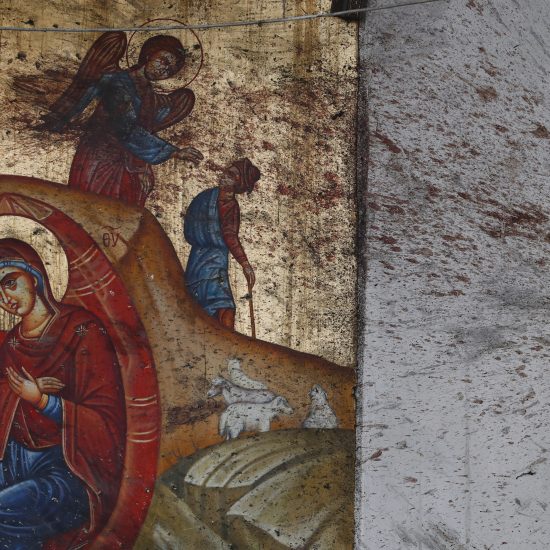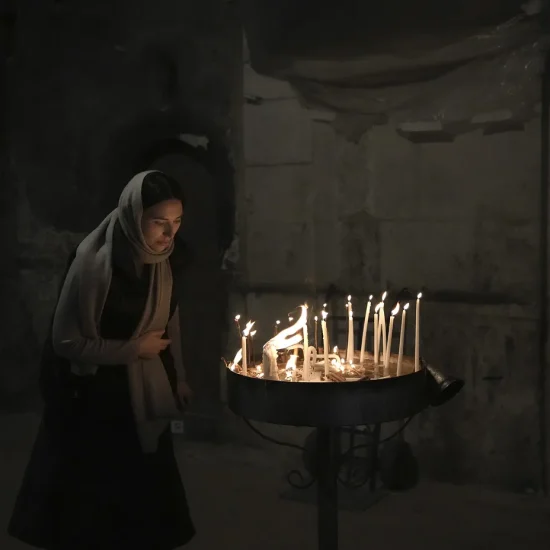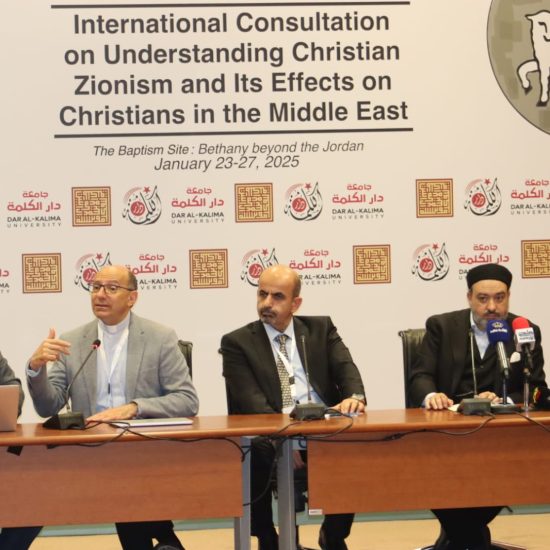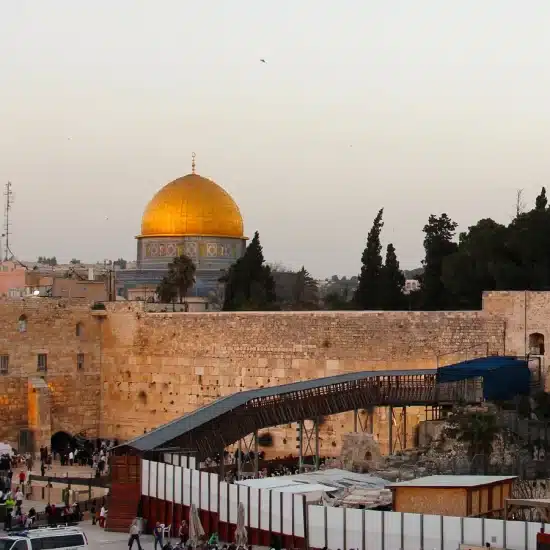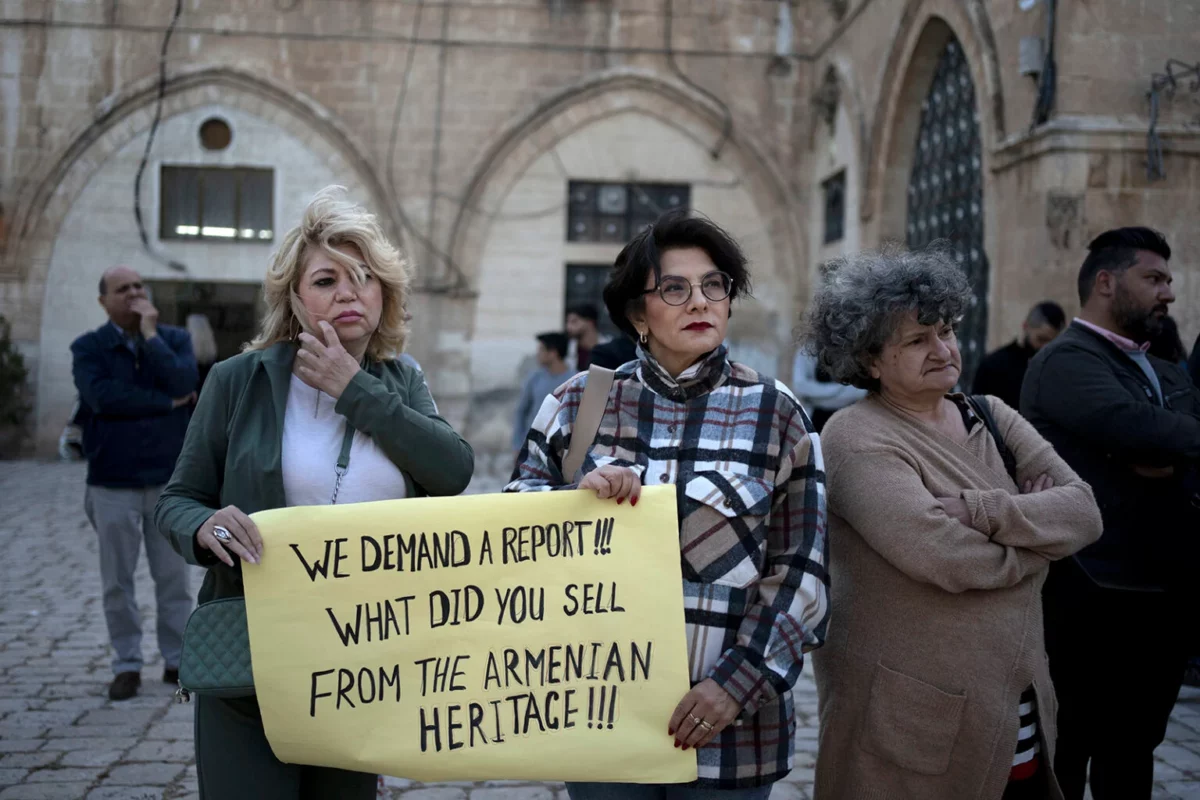
(RNS) — Amid the ongoing war between Israel and Hamas in the Gaza Strip, another battle is playing out in Jerusalem among its small but storied Armenian Christian community, their own patriarch and an Australian-Israeli businessman who is said to be set on taking over the Armenian Quarter of the Old City.
Last month, things escalated as Jewish settlers aided by dogs and bulldozers disrupted a long-running sit-in in a site known as the Cow’s Garden, currently a parking lot, where businessman Danny Rothman plans to build his latest hotel.
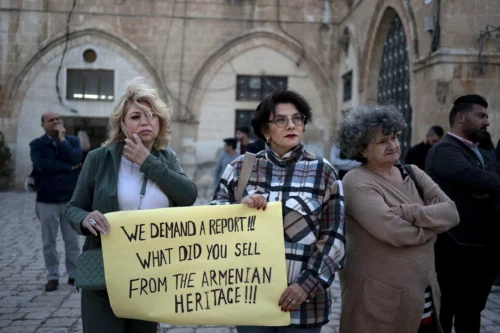
Members of the Armenian community protest a contentious deal that stands to displace residents and hand over a large section of the Armenian Quarter in the Old City of Jerusalem on May 19, 2023. (Maya Alleruzzo/Associated Press)
Rothman’s company, Xana Capital Group, made a secret deal in 2021 with the Armenian Christian patriarchate to lease a swath of the Armenian Quarter, including part of the Armenian Theological Seminary and several family homes. When the deal became public, the local community rebelled, a priest who oversees the church’s real estate was defrocked and Patriarch Nourhan Manougian’s leadership came under question.
“This is land that belongs to the Armenian community for centuries,” Levon Kalaydjian, a Jerusalem-born Armenian, told Religion News Service. “This does not belong to the patriarchate, nor is it for him, the patriarch, to do whatever he wants to do with it.”
Armenians have had a presence in Jerusalem since the fourth century, when Armenia became the first sovereign state to convert to Christianity. Some of Jerusalem’s Armenians trace their heritage to pilgrims who came to the holy city nearly that long ago, while others arrived from the former Ottoman Empire, fleeing the Armenian genocide in 1915 and 1916.
Today the smallest of the four divisions of Jerusalem’s Old City, the Armenian Quarter is considered separate from the larger Christian Quarter, where Palestinian Christians speak Arabic and worship in Greek Orthodox or Catholic churches.
The 2,000 or so Armenians, who speak a unique Jerusalem dialect of Armenian and belong to the Armenian Apostolic Church, are represented by the Armenian Patriarchate and the monastic order of the Brotherhood of St. James, which acts as a mini-welfare state: Most Armenians live in church-owned property and work in a church or monastery.
In Jerusalem’s tense cultural politics, the Armenians are widely considered the most peaceful demographic in the Old City, maintaining good relations with both Jewish Israelis and Arab Palestinians. That unique status has been complicated by the fact that they are sitting on one of the Holy Land’s most valuable pieces of real estate.
“The piece of land we’re talking about is one of the most important in the city, if not in the country and the world,” said Setrag Balian, one of the founders of the current protest movement. “Striking as it might sound, it is a fact.”
The Armenian Quarter occupies the highest point in the Old City and lies along the main path from the Jaffa Gate to the Western Wall and Jewish Quarter. It is also situated on one of the few vehicle-accessible roads in the Old City. The Cow’s Garden is one of the few undeveloped spaces inside the walls.
“The Armenian community used to feed off of that land, and Armenian pilgrims used to come camp there and put up their tents and caravans,” Balian said. “Other than the cultural and historic fact that this is the Armenian Quarter, it had economic importance; our life depended on that land.
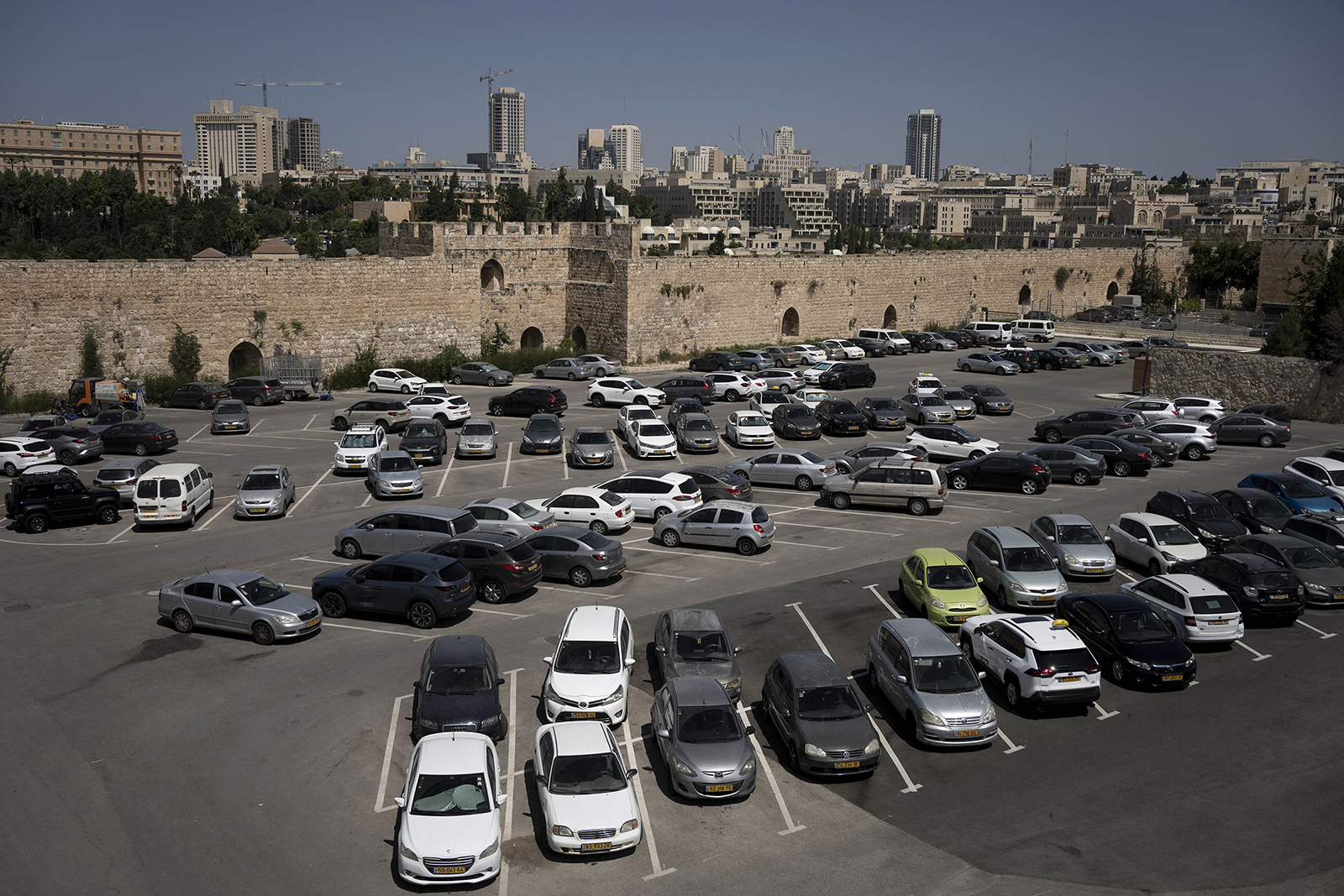
A general view of a parking lot that is part of a contentious deal in the Armenian Quarter in the Old City of Jerusalem, Tuesday, May 30, 2023. The 98-year lease of some 25% of Jerusalem’s Armenian Quarter has touched sensitive nerves in the Holy Land and sparked a controversy extending far beyond the Old City ramparts. (AP Photo/ Maya Alleruzzo)
“And today, even as parking, it depends on it. In modern times, in municipalities all over the world, one of the biggest problems is the matter of parking, so this should also not be underestimated,” he added.
It’s not the first time someone has tried to wrest control of land from the Armenian community. Enver Pasha, the Ottoman minister of war who was an architect of the Armenian Genocide, once eyed the Cow’s Garden for a summer home, while Jerusalem’s five-time mayor, Teddy Kollek, also pressed for previous patriarchs to allow construction on the land, along with numerous other potential investors.
None was successful until the deal with Xana, signed in 2021.
The 49-year lease deal will allow Xana to build a luxury hotel complex over not only the Cow’s Garden but the patriarch’s private garden and the seminary’s main hall, where nearly all of the community’s celebrations are held, some four acres in all. The deal also gives Xana the unilateral power to renew the lease for another half century after the initial term is up, for a total of 98 years.
The return for the patriarchate is a lump-sum payment of $2 million and a yearly rent of just $300,000 — less than previous offers and a paltry sum for one of the world’s most valuable properties, leading to accusations of bribery and corruption in the agreement.
Exacerbating the community’s concerns is the developer’s profile. Though Rothman, who also goes by Rubinstein, has been involved in tourism in Israel for decades, little is known about his company, which is based in Dubai, making inquiries about its history and holdings difficult.
The deal also came at a time when both Christians and Muslims in the Old City and east Jerusalem are under pressure by Jewish settler groups, attempting to take control of properties for the explicit aim of ‘Judaizing’ the city.
Patriarch Manougian has claimed that the patriarchate’s real-estate manager, Baret Yeretsian, misinformed him about the deal, and he has defrocked and exiled him. Yeretsian had to be removed from the Old City under police protection in May, due to the community protests outside of the patriarchate.
In October, the patriarch canceled the deal, saying it was illegal because it had not been approved by the Synod of the Brotherhood of St. James, but only after more than two years of internal pressure from the Armenian community.
Since the cancellation, the patriarchate has put out a statement stressing the danger to the Armenian character of the quarter, and the patriarch has at times joined the protesters in the Cow’s Garden.
“Better late than never,” Kalaydjian said.
The controversy has been compared to a 2005 scandal in the Old City, when the Greek Patriarch of Jerusalem was dismissed after signing a deal to give over Christian properties in the city to the far-right Jewish settler group, Ateret Cohanim, which some saw as a concession to Israeli designs on non-Jewish sectors of Jerusalem. Yeretsian pointed out that Rothman is a secular Jew, whose investment partner is a Palestinian Greek Orthodox Christian.
But on Nov. 5 armed settler activists appeared with dogs and bulldozers demanding that construction begin on Rothman’s hotel. Balian accused Rothman and his partner of “cheap intimidation tactics” using “settler groups that don’t even come from Jerusalem, or the Old City.”
The strategy didn’t work. “We’re a 1,700-year-old presence at least in the Old City. We are not ready to give up just at the presence of armed people or bulldozers,” Balian said.
As important are the internal politics of the Armenian community. He questioned the dismissal of Yeretsian, saying defrocking him only forfeited the patriarchate’s ability to punish him. Before the deal had been formally canceled, Balian said he rejected calls pushing for the resignation of the patriarch, as it would only set a precedent in which the patriarch can walk away from his responsibilities to the community.
Instead he believes the patriarchate, with its power and influence over the lives of Jerusalem Armenians, needs to bring in lay managers and integrate the community into its decision-making process, at least on mundane matters.
“We’re not saying that the community should decide on everything,” said Balian, “because you need that structure, you need that institution. It’s a religious institution, and we all belong to it. But let’s work together as a united front.”
In a divided Jerusalem, Balian said, what’s most important for his community is to stick together, no matter who is trying to encroach on their land. “For us, it doesn’t even matter if it’s settlers or not, or if it’s Jews or Muslims or others. Our goal is to keep that land Armenian,” Balian said.

